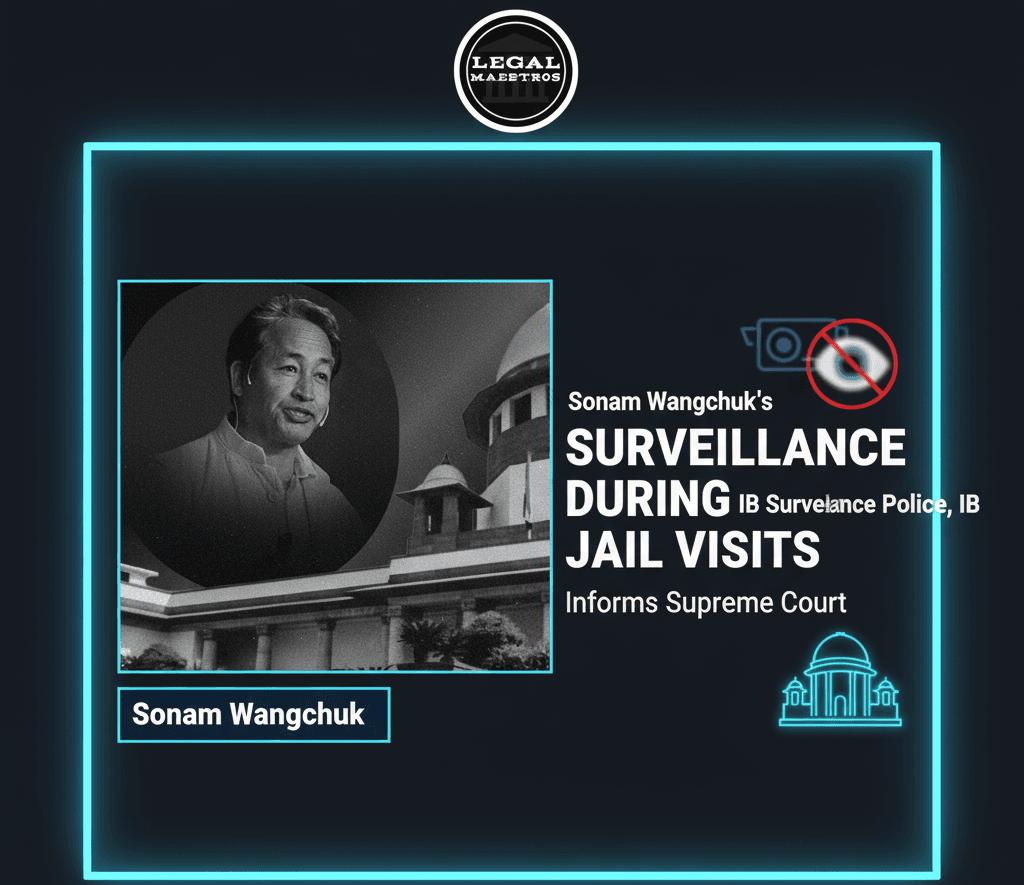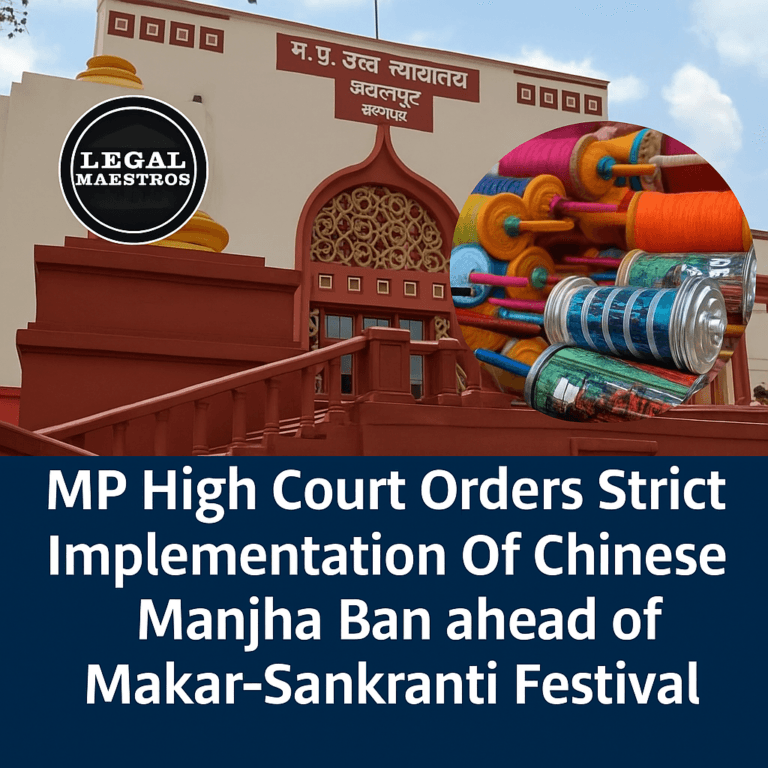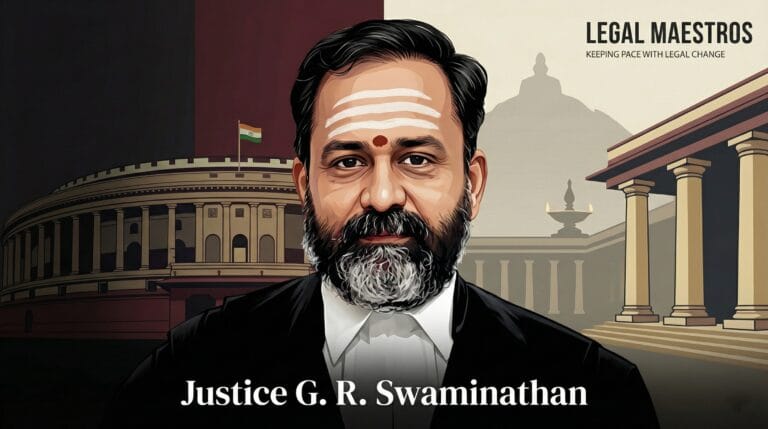
Sonam Wangchuk’s Wife Alleges Police, IB Surveillance During Jail Visits, Informs Supreme Court
Wife of Detained Activist Alleges Constant Surveillance
Gitanjali J Angmo, who is the spouse of the arrested climate activist Sonam Wangchuk, has petitioned the Supreme Court of India by stating that she is under 24-hour surveillance by the state. In a formal affidavit, she says that Intelligence Bureau (IB) officers and the Rajasthan Police officers have been closely keeping track of her movements, conversations and even her personal notes when visiting her husband in jail. Angmo contends that this spying is against her basic right as a free citizen.
. This was after violent demonstrations in September 24 in Leh, where Ladakh was demanding statehood and special status under the Sixth Schedule of the Constitution. Wangchuk had been on a hunger strike at this time, and was later transferred to the Jodhpur Central Jail in Rajasthan.
In the affidavit, Angmo explains certain cases of so-called surveillance when she came to Jodhpur on the 7 th of October and on the 11 th of October. She reveals that once she had reached the airport she was intercepted at once by IB and the police officers. They demanded that she be driven by them in a car with draped windows, which could not allow her to see outside and manage her actions in the city.
For any queries or to publish an article or post or advertisement on our platform, do call at +91 6377460764 or email us at contact@legalmaestros.com.
Ladakh administration has refuted the claims made by Angmo terming them as false and an afterthought. They claim that they were not around when she was visiting Jodhpur and they did not spy on her in Delhi. But the description made by Angmo begs serious doubts regarding the level of state surveillance on the family members of the NSA detainees.
Intrusive Monitoring During Jail Visits
The worst claims in the affidavit of Angmo pertain to the absence of privacy on the occasions she was meeting her husband in Jodhpur Central Jail. She asserts that in the two visits, the guarding policemen one of whom was a Deputy Commissioner of Police (DCP) called Manglesh and a female constable had been present throughout the meeting and were within hearing distance.
Angmo says that these officers were present throughout the conversation between her and her husband and they took notes of it. This encroachment of the spousal communication is one of the main aspects of her grievance to the Supreme Court. She claims that she has a right to have personal conversations with her husband without other parties eavesdropping or recording their talks.
Moreover, Angmo accuses that the Jail Superintendent ordered the police officer to take pictures of her personal notes after a single meeting. According to her, these notes, which she claims were on the legal defense of Wangchuk, were collected at his directive. The fact of capturing privileged legal communication is extremely problematic in terms of interruption of the right to a fair legal process.
Angmo describes the jail visit activities as being completely against her rights. According to her, being a free citizen means that she has a right to attend Jodhpur when she wants, the way she wants and to see her husband without any limit to her movements. My conversations should not have been privy to any other person.
Restrictions on Movement and Surveillance Beyond Jail
The so-called surveillance and control was not confined to the jail premises as stated in the affidavit made by Angmo. She alleges that once her encounters with Wangchuk were over, the officers did not allow her to go outside Jodhpur or see anybody even when she had a few hours to spend before her train. She was brought straight to the railway station.
Worryingly, she claims that the security personnel of the police had boarded the train with her; only to alight at the next big station, Merta Road Junction, after two hours of travel. This perpetual following around and the denial of her the freedom of movement in Jodhpur is another section of her complaint of the breach of her rights on the provisions of Article 19 (freedom of movement) and Article 21 (personal liberty) of the Constitution.
Angmo also asserts that the spying goes up to her stay in Delhi. She says that since she organized a press conference in the capital on September 30 on the detention of her husband she has been constantly followed up. The affidavit she gives then says that as soon as she leaves her accommodation in Delhi, she is followed by a car and a man on a bike no matter where she goes in Delhi.
This so-called constant trailing in Delhi indicates that there is a tendency towards a tracking, much more serious than the provision of security when visiting the jail. Angmo thinks that this treatment is indicative of a larger policy of intimacy of her husband being held and her attempts to appeal this through the law.
The Supreme Court Case Context
Gitanjali Angmo appealed to the Supreme Court with a petition of habeas corpus claiming that she was appealing against the detention of her husband on the basis of NSA. Habeas corpus writ obligates the government to present someone under detention before the court so as to explain why they are being detained. Her request asserts that the arrest of Wangchuk is unconstitutional, arbitrary, and unlawful asserting that it is politically based against any dissent on the demands of Ladakh.
The petition argues that Wangchuk is not a threat to the national security because of his non-violent practices and his Gandhian style. It claims that his basic rights, such as the right to equality (Article 14), the right to free speech (Article 19), personal freedom (Article 21) as well as the right against arbitrary arrest (Article 22) are violated. Angmo had first asserted that she was not even notified about the reasons why he was being detained and the state of his health.
The Ladakh government submitted a sworn statement explaining the arrest by pointing out that Wangchuk had given speeches in which he had mentioned the Arab Spring and Nepal agitation as provoking violence. They alleged that his actions were predisposed to the security of the State and general order.
The latest affidavit given by Angmo about the surveillance she experienced was submitted in this pending case. Justice Aravind Kumar and Justice NV Anjaria who are sitting on the Supreme Court bench have postponed the hearing to permit Angmo to make amendments to her petition. The court now has the responsibility of not only looking at the legality of the detention of Wangchuk, but also of grievous charges of surveillance and violation of freedom of his wife.








